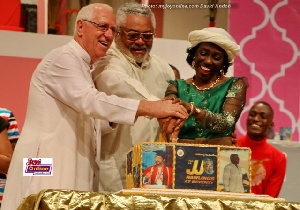Former President Rawlings has turned 70 and been celebrated by his family and friends. Amongst the celebrants was Uncle Ebo Whyte who recounted how ordinary people had been devalued and how he felt after an encounter with a waakye seller who urged him to take off his tie and join her in selling waakye.
Uncle Ebo Whyte also pledged to President Rawlings that "your story will be told". In truth, to his credit and with my begrudging admiration, President Rawlings has been telling his version of his story from the beginning of time.
Let me state at the onset that despite my biases, life should always be celebrated. Therefore, I join the Rawlings family and his friends in wishing him well. I wish though that those officers executed in the prime of their lives and the judges murdered after that fateful ride in that Fiat Campanola in 1982 had lived to be old men and died of natural causes, surrounded by their loved ones too. This also goes for the estimated 2 thousand or so who lost their lives directly or indirectly due to June 4th and 31st December.
Looking back, "objectively" to quote uncle Ebo, was it worth it?
Were there gains from June 4th and 31st December? Are we less corrupt than we were before June 4th and 31st December?
Are we more violent? Is the culture of mob violence part of the fruits of the twin revolutions? Is Major Mahama a victim of June 4th and mob violence culture it inspired?
While these questions centre on Mr. Rawlings, they are, properly speaking, questions for our society. He had accomplices and cheerleaders.
There were soldiers who sprung him from prison, killed on his behalf and protected him. There are intellectuals who rationalised his excesses. There were students who shouted "let the blood flow", even as the blood of the innocent and the guilty flowed together. And there were the workers who beat up others, bullied their bosses and sang, "J.J., do something before you die".
We are, of course, making all these judgments with the benefit of hindsight.
In recent times, we have learned, sadly that sometimes, even the prophets of probity and accountability themselves lack probity and accountability. As Nobel laureate, George Bernard Shaw put it, "No one can contemplate the condition of the masses without desiring revolution. And yet, the revolution has never lightened the burdens of tyranny. They have only shifted it on to other shoulders."
I believe that we owe a collective apology to the families of those murdered in the name of these futile revolutions. And I believe that before he is called to meet his maker, a genuine show of remorse for the needless excesses of his revolutions from Mr. Rawlings would be an invaluable service to this nation.
We must be careful that our careless praise of those who did evil with the best of intentions does not inspire a new generation of coup makers.
Elie Wiesel, a holocaust survivor pledged to dedicate his life to reminding the world of the holocaust. As he knew, remembering evil is central to preventing its repetition. Liberia forgot about Doe and they got Taylor. Rwanda forgot about past massacres and got the 1994 massacre. We forgot about June 4th and we got 31st December!
George Santayana said, "those who ignore history are doomed to repeat it". Let's not forget history and let us be careful what we celebrate. We might get more of it.
Long live Ghana.
Opinions of Friday, 23 June 2017
Columnist: Arthur Kennedy



















